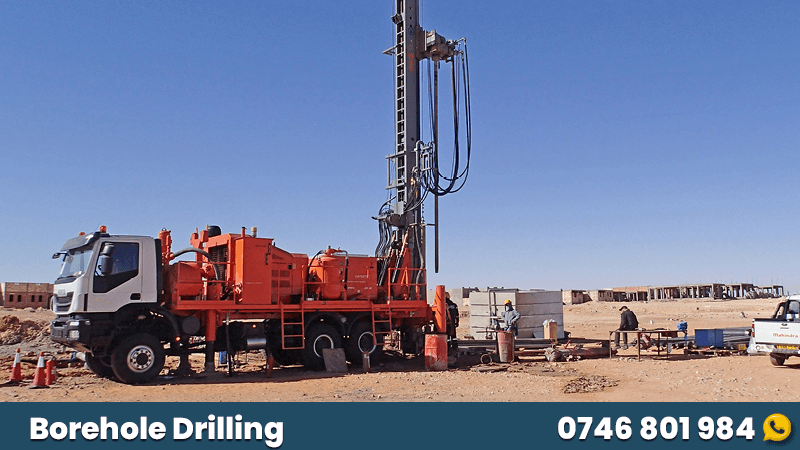Unlocking Clean Water Access: Borehole Drilling Services in Nairobi, Kenya
Access to clean, reliable water sources is a fundamental human right, yet many areas face challenges in meeting this basic need. In Nairobi, Kenya, where water scarcity is a persistent issue, Borehole Drilling Services in Nairobi Kenya have emerged as a transformative solution, offering hope and sustainability to both residents and businesses. In this article, we will explore the significance of borehole drilling services in Nairobi, emphasizing their crucial role in addressing water-related challenges and promoting a sustainable future.
1. Tackling Water Scarcity Head-On
Nairobi, the capital city of Kenya, often grapples with water scarcity due to a rapidly growing population and changing weather patterns. In such a context, Borehole Drilling Services in Nairobi Kenya play a pivotal role in providing a dependable source of water. By tapping into underground aquifers, borehole drilling services offer a sustainable solution to mitigate the city’s water woes.
2. Self-Sufficiency and Independence
One of the significant advantages of investing in borehole drilling services is the independence it provides. Rather than relying solely on municipal water sources, individuals and businesses can establish their own water supply through boreholes. This self-sufficiency ensures a consistent water source even in times of water rationing or shortages.
3. Environmental Friendliness
Borehole drilling services promote environmental sustainability. By reducing the reliance on surface water sources, such as rivers and dams, boreholes help protect natural ecosystems and reduce the strain on existing water bodies. This sustainable approach aligns with global efforts to conserve and manage water resources responsibly.
4. Cost Savings
While the initial investment in borehole drilling may seem substantial, it offers significant long-term cost savings. Once the borehole is operational, the cost of pumping water is considerably lower compared to utility-provided water. Businesses, in particular, can reap substantial financial benefits from this cost-effective water supply solution.
5. Business Continuity and Productivity
For businesses in Nairobi, consistent access to water is critical for operations. Borehole Drilling Services in Nairobi Kenya ensure that businesses can maintain productivity even in times of water scarcity or utility disruptions. This reliability is a strategic advantage that safeguards business continuity.
6. Residential and Agricultural Applications
Beyond urban areas, borehole drilling services benefit rural communities and agriculture. These services empower rural households with access to clean water for drinking and irrigation, ultimately improving their living conditions and agricultural productivity.
7. Expertise and Quality Assurance
The success of borehole drilling services depends on the expertise and experience of the drilling professionals. It is crucial to choose a reputable and experienced company offering Borehole Drilling Services in Nairobi Kenya to ensure the highest quality, well-constructed boreholes that meet local regulations and standards.
Secure Your Water Future
In Nairobi, Kenya, where water scarcity has long been a challenge, Borehole Drilling Services in Nairobi Kenya are a beacon of hope. These services empower residents and businesses to secure their water future, promote sustainability, and achieve self-sufficiency. The initial investment in borehole drilling is a small price to pay for the long-term benefits of a reliable, cost-effective, and sustainable water source.
Invest in borehole drilling services today and take control of your water destiny while contributing to a more sustainable Nairobi.

Drilling a Borehole: Unearthing the Depths of Clean Water Access
Drilling a borehole is a complex and highly specialized process that involves creating a narrow, deep hole in the ground to access underground water sources. This process is crucial for obtaining clean, sustainable water supplies in areas where surface water may be unreliable or contaminated. Let’s delve into the steps involved in drilling a borehole:
1. Site Assessment and Geological Survey
Before drilling commences, a thorough site assessment and geological survey are essential. Geologists and hydrogeologists study the location to identify the best spot for drilling. They analyze the rock formations, depth of the water table, and the potential yield of the borehole. This survey is critical in determining the borehole’s depth and diameter.
2. Securing Permits and Approvals
The next step is obtaining the necessary permits and approvals from relevant authorities. Local regulations must be adhered to, and environmental impact assessments may be required to ensure minimal disruption to the surroundings.
3. Borehole Drilling Equipment Setup
Once the site is prepared and the necessary approvals obtained, drilling equipment is transported to the location. The type of equipment used depends on the geological conditions and the depth of the borehole. Common drilling methods include rotary drilling, cable tool drilling, and percussion drilling.
4. Drilling Commences
The drilling process begins with the insertion of the drilling equipment into the ground. Drilling continues until the borehole reaches the desired depth or until water is encountered. The process may involve the use of drilling mud, which helps to cool the drill bit, stabilize the borehole walls, and carry drill cuttings to the surface.
5. Installing Casing
To prevent the borehole from collapsing and to ensure that the water supply remains uncontaminated, steel or PVC casing is installed in the borehole. This casing extends from the surface down to the water-bearing strata. It is crucial for maintaining the integrity of the borehole.
6. Well Development
After the borehole is drilled, it must be developed to remove any drilling residues and improve water flow. This process involves techniques such as air jetting, surging, and pumping. Well development ensures that the water drawn from the borehole is clean and clear.
7. Pump Installation
A submersible or surface pump is installed to draw water from the borehole to the surface. The choice of pump depends on the depth and yield of the borehole. Proper pump installation is essential for efficient water extraction.
8. Water Quality Testing
Before putting the borehole into full operation, water quality testing is conducted to ensure that the water is safe for consumption. This testing checks for contaminants and determines the water’s potability.
9. Regular Maintenance and Monitoring
Boreholes require regular maintenance to keep them in good working condition. Routine inspections, cleaning, and servicing of pumps and equipment are necessary to prevent breakdowns and ensure a continuous water supply.
A Lifeline to Clean Water
Drilling a borehole is a complex process that requires careful planning, geological expertise, and the use of specialized equipment. It is a lifeline to clean, reliable water sources, especially in areas where surface water may be unreliable or contaminated. Properly executed borehole drilling projects offer a sustainable solution for communities, businesses, and agricultural operations, ensuring access to clean water for years to come.

- Advertisements
- Appliances
- Business Services
- Entertainment
- Industry
- Information
- Places
- Property
- Public and Social
- Repair
- Residential & Domestic
- Tradesmen
- Web Design, Nairobi Kenya
- Appliance Repair in Nairobi Kenya
- Washing Machine Repair in Nairobi
- Home
